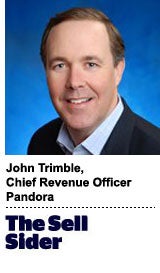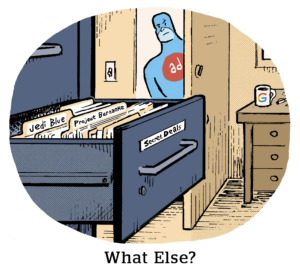 “The Sell Sider” is a column written by the sell side of the digital media community.
“The Sell Sider” is a column written by the sell side of the digital media community.
Today’s column is written by John Trimble, chief revenue officer at Pandora.
Like many events in the ad business, the conversations that happen offstage at Advertising Week can be even more impactful than those that take place in the various venues across New York.
Onstage, you’ll find big-name speakers such as Tim Armstrong of AOL and Sir Martin Sorrell of WPP, but behind the scenes, publishers will be talking about the topics that matter most to them.
With advertisers increasingly concerned around viewability and fraud, publishers are more focused than ever on data quality. And as that conversation about data quality inevitably shifts to location data, publishers are eager to find ways to help brands seize the enormous potential of location-based targeting.
At the same time, I predict mobile will dominate many conversations as publishers grapple with the challenge of identifying the best creative formats for mobile.
The Data Debate: Quality Vs. Quantity
Data conversations have historically focused on quantity, in terms of how many users can be reached or how many variables are collected or inferred based on content consumption patterns.
While these components still represent a core component of publishers’ pitches, they don’t paint the full picture. Data has quickly become a commodity, yet the market has little understanding of how to evaluate it and how data from one source matches up against data from another.
But this is starting to change. Advertisers are now asking tough questions about audience verification and viewability and, with smaller mobile screens and more bots, publishers need to not only sell on the breadth of their data but also its depth.
There’s been some buzz around publishers only selling inventory that is 100% viewable, but it won’t be long before viewability guarantees are a requirement, as opposed to a headline. That said, in order to get there we need to establish standards across tech vendors, holding companies and platforms. The inconsistency of measurement standards and technology solutions, along with the relative lack of maturity of mobile compared to desktop, has generated more confusion than action.
Reporting is going to have to get better as advertisers take a look under the hood at who is being served their ads. If publishers can’t provide an accurate picture of who was reached, with validation by a reputable third party, they won’t be able to compete for advertiser dollars.
Location: Where They’ve Been, Where The Live, Where They Are
With the advent of mobile location tracking, conversations about data often morph into discussions about how to effectively leverage latitude and longitude data. I expect some data conversations at Advertising Week will be no different.
Location data is widely available from major mobile ad exchanges. All it takes is a few easy clicks to add “real-time” location targeting to a buy. However, there are few tools available for buyers to validate the accuracy and delivery of impressions against location data.
Many mobile publishers have discovered that sending lat/long coordinates in the bid stream will earn higher eCPMs, an incentive has led to a loose definition of what is acceptable, in terms of accuracy. We need to evolve the conversation from what is possible to what is practical and effective, based on the objectives of individual campaigns, including desired reach and frequency goals. Is it more important to know where a potential customer lives, where they work or where they are at the very second the ad is delivered? Or different still, is location data better served for inference-based targeting based on where a consumer has been?
Publishers need to help brands understand and untangle the possibilities of location-based targeting. That starts with publishers paying attention to the needs and desires of their own customers while respecting their privacy.
I believe what is good for the user is good for the advertiser. Applying this idea to location tracking is simple. If collecting location data delivers an enhanced user experience, more users will be willing to give publishers permission to collect the data needed to deliver an effective solution for their advertising clients.
Respecting the end user, engaging in the right discussions with clients about how to apply location targeting and partnering with technology vendors to develop better validation tools is the path to realizing the true power of mobile advertising.
Mobile Creative: Finding the Right Harmony
Once publishers have refined their data pitch and had the location conversation, the challenge of optimizing creative of mobile still needs to be tackled.
When we think about creative in the context of mobile, it seems that brands are still searching for the right formula to effectively connect with consumers. In reality, the solution lies in understanding how to sequence several different creative formats, such as audio, video, rich media and display, with different frequency goals to deliver the best result.
Delivering a more balanced media plan, with different creative executions optimized for channels, can reinforce messaging, drive engagement and deliver stronger ROI than one format on its own. Advertisers and publishers alike are starting to recognize that testing different combinations of ad formats and creative together can often lead to superior results. There isn’t a silver bullet with regards to creative, but the combination of formats, such as display with audio, maximize awareness while creating measureable results.
I expect these mobile and data challenges to take center stage in the conversations that will take place at Advertising Week, which have evolved since the event’s early days. Advertisers are asking tougher questions and accountability for publishers is growing in parallel. Publishers must be prepared to promote not only the quantity of their data but the quality of it and how that positions them to engage in conversations about location-based targeting. By driving these conversations, mobile can gain more momentum and the industry will see the creativity and engagement that a combination of mobile creative formats can drive.
I look forward to seeing what happens onstage at Advertising Week but, with any show, it’s what happens behind the scenes that really matters.
Follow Pandora (Pandora_radio) and AdExchanger (@adexchanger) on Twitter.












